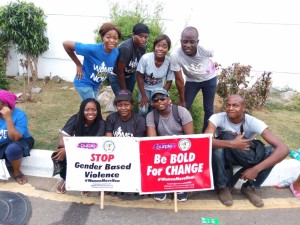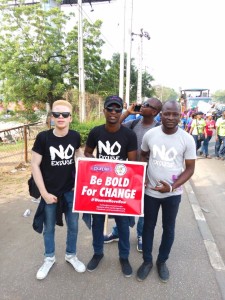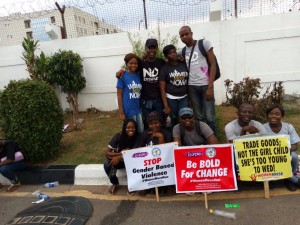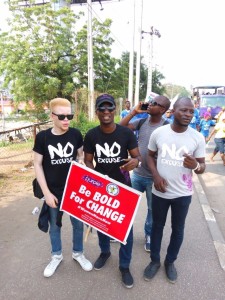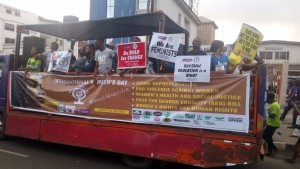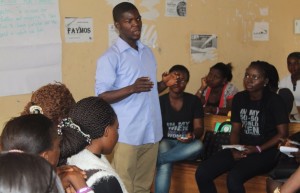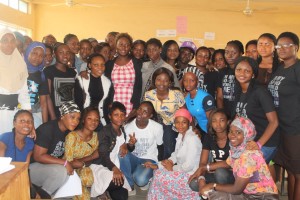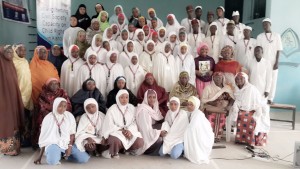Archives for 2017
KIND Youth beneficiaries march with WARDC and Purple Nigeria on IWD 2017
Beneficiaries of KIND leadership programmes in universities and polytechnics around Lagos joined Women Advocates Research and Documentation Centre (WARDC) and Purple Nigeria on a road walk for the International Women’s Day, March 8, 2017.
They marched from Ikeja Under Bridge to Lagos State Government House to discuss issues of concern affecting women in the state in commemoration of International Women’s Day but were disappointed when Governor Akinwumi Ambode did not meet with them.
KIND LEADERSHIP PROGRAMME IN UNIVERSITIES AND POLYTECHNICS
LEADERSHIP PROGRAMME IN UNIVERSITIES AND POLYTECHNICS
In partnership with the UK Department for International Development (DFID) through Voices for Change (now Purple) KIND was able to improve the Leadership, Decision making and Life-Skills competencies of adolescent boys and girls between the ages of 16 – 25 in University of Lagos (UNILAG) and Lagos State Polytechnic (LASPOTECH).
We employed the use of interactive virtual and physical platforms, referred to as ‘safe spaces’ in the school training. Over 450 young people have benefited from the leadership development programme in both schools and we are still in the process of training more.
PICTURE OF THE TRAINED STUDENTS:
Students on the programme’s impact
Buki Temitope, one trained female student said ‘The training has helped me to develop my leadership skill and made me more assertive’
Oyewunmi Waliu, one of the trained boys said ‘The training made me understand the true meaning of Gender and gender equality and also know how to convince my colleagues not to practice violence against women’
KIND Child Rights Project in Kano State
Child Rights Project (Kano State)
This is a European Union (EU) sponsored project. KIND partnered with VSO International Nigeria to carry out the project in Kano State. The Objective of this initiative is to strengthen local child rights focused based civil society organizations and promote the effective civil society and community action as an effective force in fostering an enabling environment for the passage of the Child Rights Act in the state.
We equipped 40 students and 32 teachers in 16 schools from 6 Local Government Areas in Kano State and Kano State-based CSOs on the basic requirements of child rights.
12 facts about June 12 and Abiola’s death
Chief Moshood Kashimawo Olawale Abiola, CFR was born on August 14, 1937 and died under suspicious circumstances on July 7, 1998.
He is often referred to as M. K. O. Abiola, a popular Nigerian Yoruba businessman, publisher, politician and aristocrat of the Yoruba Egba clan.
He ran for the presidency in 1993, and is widely regarded as the presumed winner of the inconclusive election since no official final results were announced.
Across Nigeria today, at least 6 states in the Southwest have declared June 12 a public holiday and are holding ceremonies in his honour.
Below are facts about the day:
1. Several of those involved in the election are dead
MKO Abiola died in detention in 1998. Justice Bassey Ikpeme, who gave the controversial order stopping the election, died in 1997.
Mr Clement Akpamgbo, the attorney general and minister of justice who was involved in the legal tussles, died in 2006.
Admiral Augustus Aikhomu, the then second-in-command to General Ibrahim Babangida, who famously said Abiola could not be sworn in as president because government was owing him a lot of money, died in 2011.
2. The celebration lasted only two hours
Following the election victory, most Nigerians celebrated in the streets. However on that fateful day, 24 years ago, the celebrations were short-lived as two hours later, the military declared the election results annulled.
3. No Hausa or Fulani politicians featured on the tickets
Strangely, the 1993 elections had no person of Hausa or Fulani blood picked as presidential or vice-presidential candidate. Alhaji Bashir Tofa is a Kanuri from Kano.
Alhaji Babagana Kingibe, a Kanuri from Borno State, was Abiola’s running mate. However, after the annulment, the Hausa/Fulani bore the brunt.
4. Abiola won the election
This is not surprising, but it is quite important to know that he won the election, fair and square. Abiola scored 58.36% of the 14 million votes cast.
His rival, Tofa, polled 5,952,087 votes, representing 41.64%. Only three states each returned more than 1 million votes, all southern: Lagos, Rivers (now Rivers and Bayelsa) and Ondo.
5. He received the highest votes in Lagos state
Abiola received his highest votes from Lagos state. He smiled home with 883,965. Ondo State (now Ondo and Ekiti) delivered a total of 883,024 votes, which gave Lagos a good run for its money.
6. The Southwest were behind him
Abiola scored more than 80% in each of the five south-western states: Lagos, Ondo, Oyo, Osun and Ogun State. Osun’s 87% was his highest percentage nationwide.
His 78% in Kwara was his highest outside of the south-west.
7. His rival scored poorly
Tofa did not score up to 80% in any state. He came close to that in Sokoto where he got 79%. Incidentally, Abiola scored his worst percentage in Sokoto (20%).
Tofa, however, did not score up to 70% in any other state after Rivers.
8. June 12 should be a national holiday
Many Nigerians are of the opinion that June 12 should be a national holiday. The date is celebrated in honour of an annulled presidential election in June 12, 1993. However, only some Nigerian states actually celebrate it.
9. Babangida’s role
The election was annulled by Ibrahim Babangida, because of alleged evidence that they were corrupt and unfair, a development that ushered in a political crisis that led to General Sani Abacha seizing power later that year.
10. Abiola declared himself president
In 1994, Abiola declared himself the lawful president of Nigeria in the Epetedo area of Lagos island, an area mainly dominated by Lagos Indigenes, after he returned from a trip to solicit the support of the international community for his mandate.
After declaring himself president he was declared wanted and was accused of treason and arrested on the orders of military President General Sani Abacha, who sent 200 police vehicles to bring him into custody.
11. Abiola’s death
Abiola died on July 7, 1998 on the day he was due to be released from incarceration under suspicious circumstances shortly after the death of General Abacha.
The official autopsy stated that Abiola died of natural causes, but Abacha’s chief security officer, Al-Mustapha alleged he was beaten to death.
12. The fairest election till date
The election was declared Nigeria’s freest and fairest presidential election by national and international observers, with Abiola even winning in his Northern opponent’s home state. June 12 is thus a day to remember chief Moshood Kashimawo Olawale Abiola as well as other democracy martyrs.

